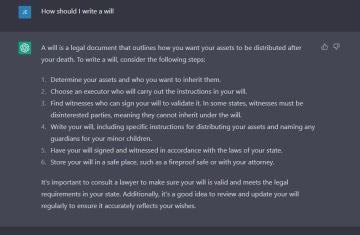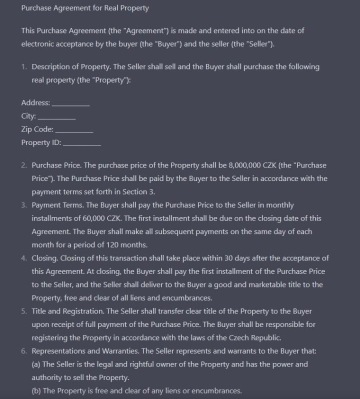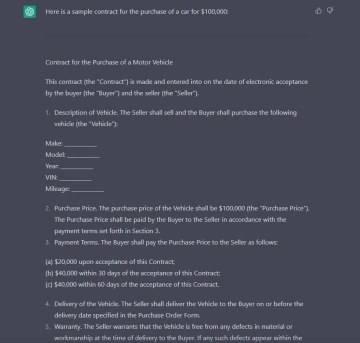A new, heartless and smartest competitor on the market. Should lawyers be worried?
Lawyers have long relied on technology for help. However, there has been no evidence until now that technology would take over attorneys’ thinking and working. That is changing with the ushering of artificial intelligence into the realm of the written word. In late November 2022, OpenAI, one of the world’s forefront AI companies, unveiled its latest creation. It is a software model that can formulate text based on learned knowledge almost as well as the best university professor of any faculty. Or all faculties combined. In 95 or more languages. Its name is ChatGPT 3.5.
The development of the Generative Pre-trained Transformer (GPT) started in 2015 when its creators at OpenAI wrote the code based on which GPT works. Over the next few years, the model was learning from so-called training data. Teaching this AI (artificial intelligence) model the desired skills consisted of providing it with “fodder”, a kind of intellectual diet that the AI memorized and then used in a context. The data fed to GPT came from nowhere other than the content of the Internet. The timeframe for this data package intended for pre-training GPT ended in 2021.
The aforementioned source of information which served as fodder for GPT presents a knotty problem. GPT generates its answers primarily from data gathered from the best known and most visited website, i.e., Google. That way, Google inadvertently handed OpenAI a loaded gun because, as the ongoing conflict between the two companies demonstrates, Google has realized that ChatGPT is technologically a step ahead. In the first week alone, OpenAI reported activity from over a million users, with a goal of attracting 1 billion by the end of 2023. While GPT cannot draw on actual data, it can completely deliver on the wishes of the principal. Google is merely capable of searching for a solution, and then the principal may choose from the searched sources. GPT has therefore “cut out the middleman”, so to speak.
That artificial intelligence is usually pre-trained on general online data substantially limits its performance. The original primary data found on the Internet are always produced by a human mind. Contrary to artificial intelligence, such data are emotionally, morally, and perhaps even factually coloured. An artificial intelligence like ChatGPT can merely linguistically compare the data and, based on the result, assess the most likely linguistically correct interpretation. In addition, it (unfortunately) performs this process on the basis of the most repeated information in the training data. So, if the sample contains three sources of information that Elon Musk is a hypocrite, and two sources that he is not, the AI’s evaluation is that Elon Musk is a hypocrite. (This was an actual ChatGPT response that became very popular, and Elon Musk himself responded to it.) In legal terms, such a situation would obviously be unacceptable. But what if the training data are error-free and properly authenticated?
What makes GPT so popular and well-regarded is the fact that the developers have also used human verification of the data (the Reinforcement Learning component), which helps make communication with GPT seem human-like and very fluent. Unlike Siri on your phone, GPT remembers your entire conversation and responds in context. And on top of that, the whole model is currently available free.




In addition, AI can be used to analyse legal data and predict case outcomes, which can help lawyers develop strategies and negotiate settlements. AI-powered tools can also assist lawyers in quickly finding relevant case law and legislation, which can speed up the search process. And AI-powered chatbots can be engaged to answer legal questions and provide basic legal advice to clients in order to reduce the need for lawyers to handle routine tasks.
(The italicized text was written by ChatGPT in response to a question: How would you be able to help lawyers?)
I believe that this is the most powerful driver of the current pillars of legal practice and justice to date. There are three significant milestones in the history of these fields. The first is the printing press introduced in 1450, the second is the genesis of legal systems such as ASPI at the beginning of the millennium, and the third - and perhaps final - milestone is the birth of artificial intelligence. AI represents an underappreciated but very powerful flame of fire. And those who fail to learn to work with it risk seeing their practices burn in the near future, in contrast to their competitors.
A few years ago, robotic arms began to be installed in factories and conveyor belt workers became redundant. The question is whether, with the arrival of AI in the intellectual world, white-collar workers such as lawyers will also become redundant. This is a legal article, so you will understand when I answer this question, “It depends.” As mentioned above, AI operates on the sample of data provided. As long as it operates within the scope of that data, it is never wrong. That is why AI can be helpful in, for example, filling out lawsuit forms, formulating declarations, or even writing closing arguments and simple court filings, and it can do it error-free, in a short time, and at very low cost. AI cannot think outside the confines of a sample, so it can never (like any computer in general) perform a task accidentally. Ethical, moral, or literal thinking outside the box is not an option for AI. So, GPT will be capable of assessing the facts, but will not know what the assessment implies. As a result, more complex legal matters that need to be assessed with a dose of human approach and a certain amount of randomness (randomness in the AI world, justice in the human world) will remain - for now - in the hands of lawyers.
Do you think you can replace lawyers?
As an AI, I am able to automate and speed up many routine legal tasks, such as contract drafting and case law searches. However, lawyers are still needed to provide expert legal advice, make decisions on complex legal issues, and negotiate with other parties. In addition, AI lacks the ability to distinguish between ethical and moral issues, which are often crucial for lawyers. Rather than replacing lawyers, AI can help lawyers do their jobs more efficiently and quickly, allowing them to devote more time and attention to complex and highly specialized legal issues.
Michal Matejka

Jan Bulinsky
This article was published on epravo.cz.



